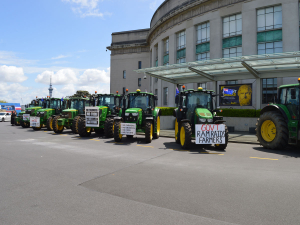94% of NZ farmers oppose Paris Agreement, survey shows
A survey of 2000 farmers shows 94% of respondents believe that remaining in the Paris Agreement for climate change is not in the country's best interest.
 About 500 protestors turned up in their tractors and utes at Auckland’s Domain as part of the Groundswell protest.
About 500 protestors turned up in their tractors and utes at Auckland’s Domain as part of the Groundswell protest.
Groundswell founder Bryce McKenzie says he is ultimately unsurprised by the results of a recent Curia poll which showed a lack of support for methane emissions pricing.
The poll, commissioned by Federated Farmers and conducted prior to nationwide protests on the issue, showed that only 26% of respondents thought New Zealand should price agricultural emissions before other countries.
57% of those surveyed were opposed with a further 17% unsure.
“I think it’s wonderful, but I’m not surprised,” McKenzie told Dairy News of the result.
He says people are starting to wake up to the idea that when methane is taxed, it will make a huge difference to rural areas and it’s an impact McKenzie claims will feed into the cities.
“It’s going to push food prices up and it’s going to create a scarcity,” he says.
McKenzie admits that New Zealand does export a lot of its product, but he says the flow on effect from the policy will be that those export markets will still want the product.
“That’s not going to leave any more food for New Zealand just because the price goes up as other countries accept that price,” he says.
McKenzie told Dairy News that while he hopes the results show his organisation’s campaigning and lobbying is working, he also thinks there is more to it than that.
“I think common sense is prevailing. I think… people generally, once they get a few facts put in front of them are pretty quick to work out the consequences for themselves, especially if it’s going to be in their back pocket.”
He’s not alone in that perspective on the results.
ACT Party primary industries spokesperson Mark Cameron says the poll shows New Zealanders simply don’t want methane pricing before any other country.
“The farm tax will ultimately be a food tax as prices of meat and dairy rise as a result,” Cameron says.
He says the proposal doesn’t come close to resembling what was put forward by the He Waka Eke Noa partnership earlier this year.
“It doesn’t recognise sequestration, it doesn’t involve farmers in the governance, and the levy will be set by the Minister,” Cameron claims.
He says the Zero Carbon Bill, which ACT voted against in 2017, set a target for farm emissions.
That target was 24% below 2017 levels.
“The solution that Labour has chosen to meet the target is to hammer our farmers and increase global emissions.
“Kiwi farmers are the most emissions-efficient in the world and they’re not praised enough for this, but there’s more work to be done.”
Federated Farmers national president Andrew Hoggard notes there doesn’t appear to be much of a rural-urban divide in the numbers.
“It seems no matter where you are in New Zealand, you are against the proposed methane tax,” Hoggard says.
He says Kiwis should be concerned by the numbers put out by the government.
“New Zealand’s farmers lead the world in producing meat and milk with the lowest emissions footprint.
“If they’re pushed into reducing production by new taxes, and that shortfall on international markets is picked up by less emissions-efficient farmers, global warming increases and we’ve hammered our domestic economy for no gain,” Hoggard says.
Budou are being picked now in Bridge Pā, the most intense and exciting time of the year for the Greencollar team – and the harvest of the finest eating grapes is weeks earlier than expected.
The Real Estate Institute of New Zealand (REINZ) has released its latest rural property report, providing a detailed view of New Zealand’s rural real estate market for the 12 months ending December 2025.
Rural retailer Farmlands has released it's latest round of half-year results, labeling it as evidence that its five-year strategy is delivering on financial performance and better value for members.
OPINION: "We are back to where we were a year ago," according to a leading banking analyst in the UK, referring to US president Donald Trump's latest imposition of a global 10% tariff on all exports into the US.
DairyNZ says the Government’s proposed Resource Management Act reform needs further work to ensure it delivers on its intent.
Overseas Trade Minister Todd McClay says he's working constructively with the Labour Party in the hope they will endorse the free trade agreement (FTA) with India when the agreement comes before Parliament for ratification.
OPINION: Expect the Indian free trade deal to feature strongly in the election campaign.
OPINION: One of the world's largest ice cream makers, Nestlé, is going cold on the viability of making the dessert.